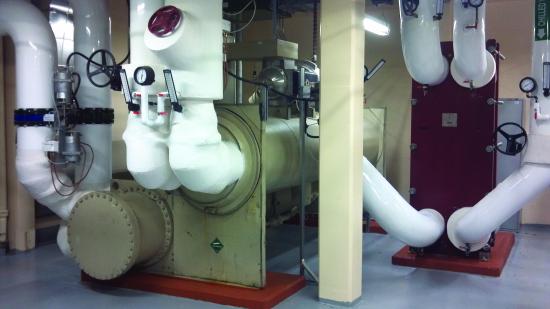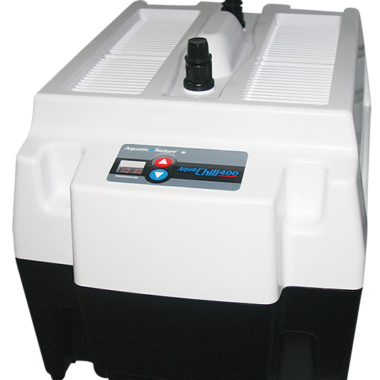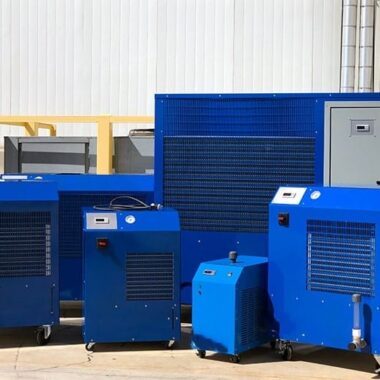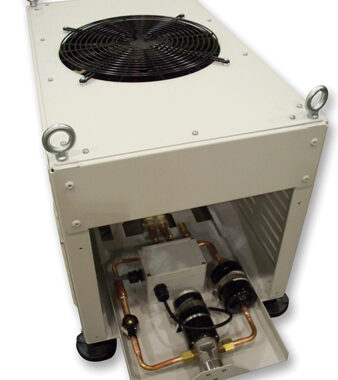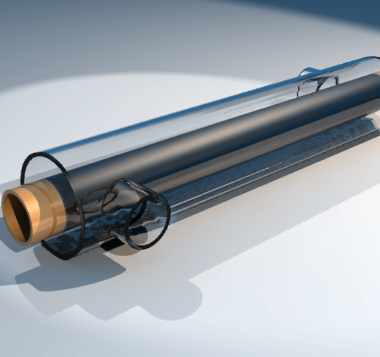Chillers in Medical Facilities
Introduction
Chillers in Medical Facilities play a crucial role in maintaining precise temperature control for various medical applications, ensuring the reliability and efficiency of critical equipment. From MRI machines and CT scanners to laboratories and blood storage units, these chillers are essential for preserving the integrity of sensitive materials and ensuring optimal performance in high-stakes environments. In hospitals and research facilities, chillers help maintain stable temperatures, safeguarding both patient care and scientific research, making them an integral component of modern healthcare systems.
Key Applications in Medical Facilities:
- MRI and CT Scan Cooling: Medical imaging devices like MRI and CT scanners generate significant heat during operation. Chillers prevent these machines from overheating, ensuring they function optimally and reduce the need for frequent maintenance. Maintaining stable temperatures is essential to prevent equipment malfunctions and improve diagnostic accuracy.
- Laboratory and Pharmaceutical Cooling: In research laboratories, chillers maintain the ideal temperature for the storage of biological samples, chemical reagents, and sensitive pharmaceuticals. Any deviation in temperature can degrade the quality of these samples, leading to inaccurate results or loss of valuable resources.
- Operating Rooms and Surgical Suites
Chillers are critical for maintaining optimal temperatures in operating rooms, where both equipment and surgical personnel need to operate in a stable, cool environment. Overheating can not only reduce the efficiency of medical equipment but also put patients at risk. Chillers ensure precise temperature control, enabling a safe and sterile environment during surgeries. - Medical Imaging Equipment Cooling
Advanced medical imaging technologies, such as MRI machines, CT scanners, and X-ray machines, generate significant heat during operation. Chillers help dissipate this heat, preventing overheating and ensuring that the sensitive electronics within these machines function optimally. - Pharmaceutical Storage and Blood Banks
Temperature-sensitive products like medications, vaccines, and blood supplies must be stored under strict conditions to preserve their efficacy and safety. Chillers maintain the required cold chain for these products, ensuring that blood banks and pharmaceutical storerooms consistently operate within specified temperature ranges. - Laboratories and Research Facilities
Medical laboratories, particularly those handling chemical reactions, cell cultures, or biological specimens, require precision temperature control to prevent contamination and degradation of samples. Chillers maintain stable environmental conditions in research laboratories, enhancing the quality of research outcomes and the integrity of clinical trials. - Medical Equipment Cooling (Lasers, Dialysis, etc.)
Various types of medical equipment, such as laser machines for surgeries or dialysis machines, generate heat during operation and require continuous cooling to function efficiently. Chillers in these applications ensure that the equipment remains at a safe operating temperature, reducing the risk of equipment breakdown and ensuring reliable patient treatment. - Sterilization Units and Autoclaves
Autoclaves and sterilization units generate substantial heat while disinfecting medical instruments. Chillers are used to rapidly cool down these units after the sterilization process, ensuring that the facility is ready for the next round of equipment in a timely manner. Rapid cooling also helps in maintaining the safety and efficiency of sterilization cycles, which is vital in preventing hospital-acquired infections. - Radiation Oncology and Cancer Treatment Centers
In cancer treatment centers, equipment like linear accelerators used in radiation oncology require precise temperature management to avoid disruptions in patient care. Chillers support the cooling of these high-energy machines, ensuring continuous, reliable operation during critical treatments like radiation therapy, which requires uninterrupted service for optimal patient outcomes. - Data Centers in Hospitals
With the increasing digitization of patient records and healthcare services, data centers in hospitals have become essential infrastructure. Chillers play a vital role in cooling the servers and data processing systems that handle electronic health records (EHR), telemedicine platforms, and other critical IT systems.
Features of Medical Chillers
- Precision Temperature Control: Medical chillers offer advanced precision in temperature control, maintaining cooling to within ±0.1°C. This ensures stability in equipment such as MRI and CT scanners that require exact temperatures for optimal functioning.
- Redundant Cooling Systems: In medical environments, failure of cooling systems can have critical consequences. Hence, chillers often come equipped with redundant systems, ensuring a backup is always available to maintain cooling if the primary system fails.
- Energy Efficiency with Variable Speed Drives: Chillers in medical facilities often feature variable speed drives (VSDs), which allow for energy-efficient operation by adjusting compressor and fan speeds based on the real-time cooling load. This minimizes energy waste and cuts operational costs while ensuring constant cooling.
- Low Noise Operation: Noise can disrupt the quiet environments required in medical settings like hospitals. Chillers designed for medical applications are built with low-noise fans, insulation, and vibration-reducing components, making them suitable for sensitive environments such as operating rooms and laboratories.
- High Reliability for Continuous Operation: These chillers are engineered for 24/7 operation, offering high reliability and durability. Medical facilities cannot afford system downtimes, so chillers come with robust components designed for continuous, long-term use.
- Compact Design for Limited Space: Space in medical facilities is often limited, so chillers are designed to be compact yet highly efficient. Their space-saving designs make them suitable for installation in tight mechanical rooms or rooftop settings.
- Compliance with Medical Standards: Medical chillers must meet strict industry standards, including FDA regulations, to ensure safety and reliability in healthcare environments. These standards ensure that the chillers meet the rigorous demands of critical medical applications.
- Remote Monitoring Capabilities: Many modern chillers come with remote monitoring features, allowing facilities to track performance in real time. This helps prevent failures and optimize operations by alerting maintenance teams to potential issues before they cause downtime.
Conclusion
Chillers are indispensable in medical facilities, ensuring the optimal performance of critical equipment, safeguarding sensitive materials, and maintaining a controlled environment for patient care. Their role in protecting medical devices, supporting patient outcomes, and facilitating medical research makes them a cornerstone of modern healthcare infrastructure.


